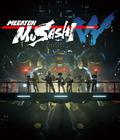
Genre: Action
Publisher: Konami
Developer: Hudson
Release Date: September 12, 2006
 Rengoku II is like a blow to the stomach, personally delivered by Konami.
Rengoku II is like a blow to the stomach, personally delivered by Konami.
Too bad we can't get that plastered on the back of the box, next to whatever frothing mis-quote Konami managed to grab.
Yes, Rengoku II: Stairway to Heaven has a title that insinuates an elevation in quality. There's an elevation in something, all right, but I wouldn't necessarily use that word to describe it. The original, fittingly subtitled Tower of Purgatory (a perfect symbol of the mediocre frustration through which it led players), was a game where a sci-fi robot with interchangeable arms killed things and opened doors. This sequel is a game where a sci-fi robot with interchangeable arms kills things and opens doors.
Not that there's anything wrong with that formula, if applied correctly. There's a lot of killing and opening of doors in Phantasy Star Online, but that game is generally highly regarded. There's more of the same in Doom, the first-person shooter that fathered all modern first-person shooters, although id Software added a special feature to mix things up: keys! Or how about Bounty Hounds, that above-average Dynasty Warriors-in-the-future PSP game? You kill guys, a door opens, and you move on. All fun games, or at least close enough to it that you might not notice one way or the other.
Tower of Purgatory and Stairway to Heaven (religious metaphors ahoy!) expose the more common side of this gameplay concept: There isn't much to it. What qualities do these games not have that the titles in the previous paragraph do? Well, nothing with which to keep you distracted.
Let's break this down part-by-part – literally, in the case of this paragraph – just to keep things simple. First, we'll go for the weapon customization feature. Phantasy Star Online had grinders, which customized the attack power of any of the hundreds of compatible weapons. Also, it had hundreds of weapons, as well as other items, to keep one's mind occupied beyond the fact that they have just spent 200 hours clearing a room just to unlock a door. Doom simply gave players the coolest weapons imaginable. Bounty Hounds had good weapon design, and despite the character not being a robot, even more customization than Rengoku's protagonist, without having a removable head.
Stairway to Heaven adds a removable head to the mix. If that's enough to sell a game, I guess you should have at it.
I won't continue to compare to those games listed above, but let's face it: They managed to handle the style very well, without moving far from the core of the basic concept. The Rengoku games – and I'm mentioning both here because so many problems were not fixed from one game to the next – cast a very bright light on how simplistic this design really is without the extra frills. Honestly, it's as if Konami went out of their way to drive this point home. When you want to save, you're going to backtrack, usually a very, very long way, unless you're willing to leave this game in your system and put it on sleep mode. Giving players a second look at these environments isn't a good idea; it ends up looking like a square, another square, a rectangle, another square … all with different skins, of course, but still the same thing, over and over again.
The music is irritating butt-rock, as a title like Stairway to Heaven (oooh, rawk 'n rawl reference!) readily hints at. But mostly, you'll be listening to the slap-crash-slap of hitting enemies with the same exact combo over and over ad infinitum – at least until you get one of the few available weapon upgrades (I say "few" in comparison to other games in this genre), and you change up the combo. When you do this, get used to it, because you'll probably be sticking with it for hours. After all, why sacrifice effectiveness for the sake of making a game not completely mind-numbing to play through?
The one bit of slack I'll give Stairway to Heaven is in the graphics department. The environments never look particularly exceptional, but many are at or above average the first time you see them. The few artistic concepts this title has are repeated so many times that they stop looking so nice extremely quickly. Still, the techno-futuristic-semi-religious setting, designed by a famous manga artist, has a limited appeal to it, but it loses much of it when this type of gameplay is wrapped around it, and you see the surroundings as much as you do.
Really, the flagship feature of Rengoku II is the fact that the analog nub is usable now. Seriously, that's the only real, true, blue improvement, and most players – not including myself, as I actually like the nub, believe it or not – won't even use it in the first place.
The reason I'm so shocked with the condition of this game is that Konami seems so dead-set on creating a franchise, yet they refuse to fix problems within the full sequel. This is a series that will be stretching its interchangeable limbs onto the PS3, making an attempt to help justify that $500-$600 price-range, and they can't even promote that future effort by creating a worthy game for a lower-budget platform. Next-generation games, especially on that platform, are going to have extremely high expectations behind them. These portable versions are probably seen as low-budget promotional tools for that higher-end title, but really, if you don't make good advertisements, who's going to buy the product? Konami should have changed their tune and created proper entries for the PSP, or at least fixed the sequel, if the first one needed to be rushed so badly.
As so many games end up being perceived, there just isn't a reason for Rengoku II: Stairway to Heaven to exist besides duping buyers into picking up a throwaway title, or, the most likely case, to get PS3 owners who've never played the PSP versions to pick up that game just because the franchise seems familiar somehow.
Score: 3.5/10









































